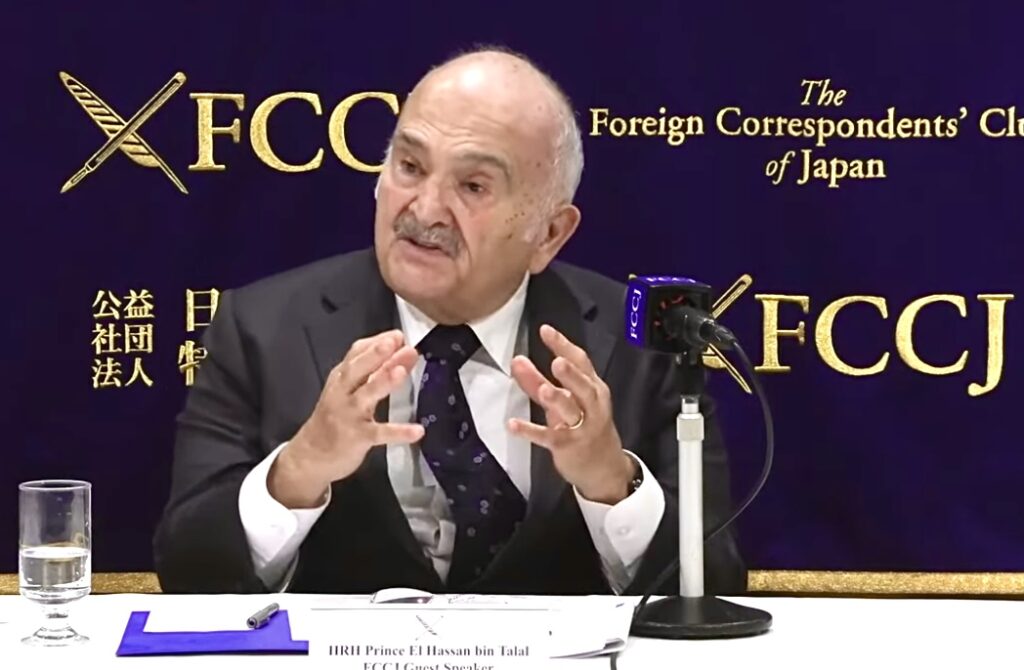
- ARAB NEWS
- 15 Jun 2025

TOKYO: Prince El Hassan bin Talal of Jordan says for millions of people in the Middle East, ‘violence has become the norm; in fact, it’s almost a way of life as described by Achille Mbembe as the politics of death,” a term that refers to the use of social and political power to dictate who may live and who must die.’
Prince El Hassan’s words carry a sense of urgency as he addresses the pressing issues in the Middle East. “It didn’t take COVID to wake us all up to the fact that our problems are transnational, and I have been trying to make the point that the human person is particularly vulnerable,” he told reporters at the Foreign Correspondents Club of Japan on Monday.
He said a solution to problems in the Middle East will be difficult due to an absence of dialogue. “Appreciating that on a scale of ten, we can agree or disagree on eight or nine points but always leave that possibility open that the issue on the discussion is open for amendment.”
“Today, can we talk about regional peace without any regional mechanism? There is no regional preventative organization in our region, and, indeed, there is no regional economic and social council in the Levant region, so we are a region by name only.”
The brother of the late King Hussein added, “The biggest challenge we face today is territoriality, identity, and migration. We must stabilize a region if we want to move forward. The second point of peace is that peace should be people-to-people, and our region should become pluralistic rather than polarized. Polarities of hatred take us nowhere. Pluralities of respect and protection might lead us somewhere.”
The Prince thanked Japan for supporting the United Nations Special Commission on Palestine (UNSCOP) and the United Nations Relief and Works Agency for Palestine Refugees in the Near East. However, he emphasized that the occupying power is responsible for the care, protection, and provision of services to persons under occupation.
Prince El Hassan noted that the Oslo Accords propelled Jordan to enter direct negotiations with Israel, following in the footsteps of Egypt and Syria.
“The Palestinians,” he said, “thought that they would be able to achieve much more in the Oslo accord,” while the reality is that Israel took lands from the Palestinians and Israel became one of the world’s largest suppliers of military equipment. “The reality is that this is not a part of a contribution to building a two-state solution.”
He pointed out that the settlers themselves are no longer Ashkenazis. Rather, they tend to come from the West. For the Arabs, he said, it was important that their identity be recognized.
Prince El Hassan underlines the importance of regional unity. He points out the absence of a regional entity uniting what he referred to as the Levant, which includes Turkey, Syria, Iran, Iraq, Jordan, Lebanon, and Palestine and has 300 million people in it. Instead, he said, “We are all in an American zone of influence.”
The Jordanian Prince El Hassan’s message is one of hope for a better future. “The time now is to begin to plan our future by recognizing that both sides have committed savagery toward each other in continuing wars. But the time has come to recognize that human dignity for all is the only way to achieve progress towards stability for all in this troubled region,” he stated.
Prince El Hassan suggested that addressing the people’s basic needs – water, energy, food – should go hand in hand with human rights and the right to protection. “The impact of the killing of the last almost 13 months is almost lost on us and the statistics are overwhelming.
He pointed out that in the attack on Israel on October 7 last year, 38 Israeli children were killed, one of them under the age of 2. Since then, 13,039 children have been killed in Gaza, of whom 786 were under the age of 1. In addition, 165 children have been killed in the West Bank.
‘The numbers numb people,’ he said. ‘They are not motivated anymore to look for solutions. Because why is it that the people in the region should suffer, whether Israeli or Arab and at the same time, the people in the region should look for solutions? It is easier to look for strong leadership, but strong leadership does not necessarily bring peace to the region. It may cause more suffering on the peoples of the region.’